Rwanda genocide: How Félicien Kabuga evaded capture for 26 years

Wealthy businessman Félicien Kabuga outwitted prosecutors of the Rwandan genocide tribunal for more than two-and-a-half decades by using 28 aliases and powerful connections across two continents to evade capture.
The 84-year-old had been on the run for so long that the international tribunal set up to bring to justice those responsible for the 1994 genocide had ceased to work.
But he was eventually hunted down last weekend to a hideout in a suburb of the French capital - thanks to an investigation relaunched by Serge Brammertz, a UN war crimes prosecutor heading the body which handles outstanding war crimes cases for Rwanda and Yugoslavia.
"We knew already a year ago that he was very likely to be in the UK, France or in Belgium and we concluded only two months ago that he was in France," the chief prosecutor for the UN's International Residual Mechanism for Criminal Tribunals' (IRMCT) told the BBC.
"The French authorities located the apartment in which he was hiding, which led to the operation."
One of the major reasons he was able to be on the run for so long was "the complicity of his children", he said.
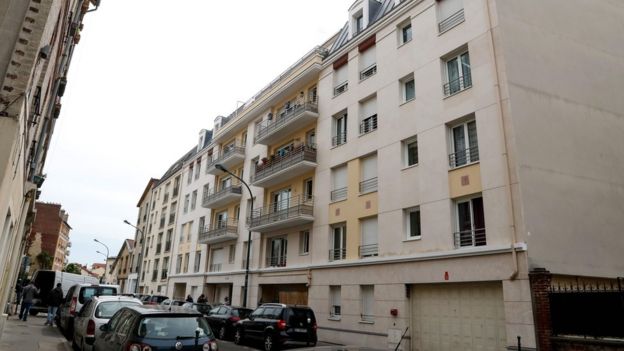
He is known to have at least five children - two of his daughters were married to sons of Rwanda's former President Juvénal Habyarimana, whose death when his plane was shot down 6 April 1994 triggered the genocide.
French investigators spied on Mr Kabuga's children to track him down to his third-floor flat in the Paris suburb of Asnières-sur-Seine, where he had been living under a false identity using a passport from an unidentified African country.
According to Col Eric Emeraux, who heads a special French police unit fighting war crimes, the coronavirus pandemic also helped as the lockdown in France paralysed many operations across parts of Europe, freeing up time to focus on the man accused of being the main financier of the genocide.
In just 100 days in 1994, about 800,000 people were slaughtered in Rwanda by ethnic Hutu extremists - who Mr Kabuga, a man who had made his fortune in the tea trade, is said to have backed.
They were targeting members of the minority Tutsi community, as well as their political opponents, irrespective of their ethnic origin.
The United States had offered a $5m (£4.1m) reward for information leading to Mr Kabuga's arrest.
But it was puzzling that for so many years one of the most wanted fugitives in Africa, with a $5m (£4.1m) US bounty on his head after being charged with seven counts of genocide and crimes against humanity in 1997, managed to live in subterfuge and evade law enforcement across countries and continents.
Was he harboured in Kenya?
Mr Kabuga is alleged to have lived in many countries in East Africa, including Kenya, where he and his family had business interests.
Kenya was for long said to be harbouring the fugitive, with powerful politicians accused of thwarting efforts to arrest him. 
Who is Félicien Kabuga?
- Considered the richest man in Rwanda before the 1994 genocide
- Made his fortune from tea in the 1970s and ventured into many other sectors at home and elsewhere
- Was close to the ruling MRND party - and related by marriage to President Juvénal Habyarimana, who died in 1994
- Accused of being the top sponsor of the genocide plan and using his business and premises to organise and fund the killing
- The main owner of the private radio station RTLM that was accused of inciting ethnic Hutus to kill Tutsis
- The United States had offered a reward of $5m (£4.1m) for information leading to his arrest

In 2006, the International Criminal Tribunal for Rwanda said it had evidence that Mr Kabuga either visited or resided in Kenya, where he carried out business interests.
Three years later, Stephen Rapp, then US ambassador-at-large for war crimes, accused successive Kenyan governments of refusing to hand over Mr Kabuga.
There was evidence that Mr Kabuga even attended functions attended by influential persons, he said - allegations Kenya has always denied.
There is no dispute that the Kabuga family owned assets in Kenya as one property became the subject of a court case in 2015 when his wife, Josephine Mukazitoni, who co-owned it, tried and failed to regain access to it.
Known as Spanish Villas, it had been seized because of a UN resolution requiring member states to trace and freeze Mr Kabuga's assets.
Wild goose chase
Media reports pointed to Mr Kabuga's presence in Kenya at different points, though they never provided proof that he or his wife lived there.
He is said to have escaped police dragnets multiple times in Kenya's capital, Nairobi. 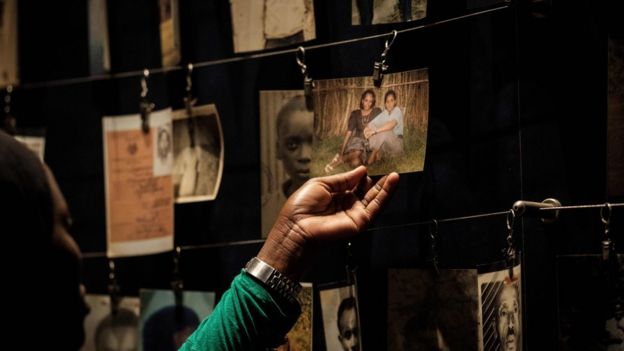
In one raid in Nairobi on 19 July 1997, when police arrested seven other Rwandan genocide suspects, Mr Kabuga allegedly escaped thanks to an earlier warning from a senior officer.
For journalists on his tail it proved a dangerous business.
On 16 January 2003, freelance reporter William Munuhe was found dead in his apartment in Nairobi. 
His brother Josephat Gichuki says after his death he discovered that Munuhe was planning a sting operation with the FBI to arrest Mr Kabuga by posing as a businessman.
"To our surprise, police said Munuhe's death was a suicide [from carbon monoxide poisoning] after inhaling fumes from a charcoal stove," Mr Gichuki told the BBC.
"While at the mortuary, I personally saw a bullet wound in his head, and blood in his room." 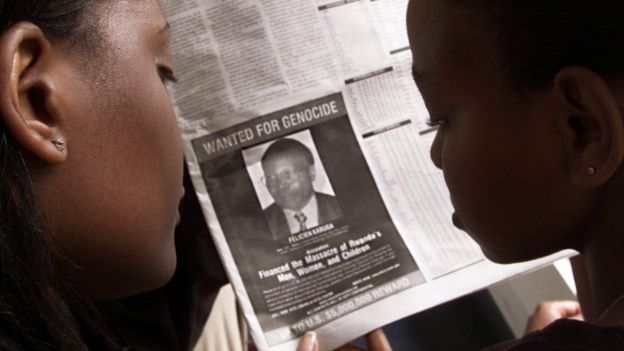
Eight years later journalist John Allan Namu believes he was deliberately misled by a source in Kenya to out the wrong person, an unsuspecting businessman, as Mr Kabuga.
He feels this was done because some were unhappy about what his investigations had unearthed, including evidence that Mr Kabuga had a Kenyan bank account through which he was conducting business.
The whole affair became so messy that he and his family were forced to go into hiding for months because of the death threats he was receiving.
"Where he was arrested is a proof that Kabuga survived as a fugitive for such a long time because of the connivance of people across the globe, not least in Kenya," Namu told the BBC's Great Lake Service.
The hunt
In the immediate aftermath of the genocide, Mr Kabuga fled to Switzerland but was not allowed to stay, and reportedly came back to Africa via Kinshasa, capital of the Democratic Republic of Congo.
Most evidence points to his presence in Kenya, though Mr Brammertz says there had also been sightings of him in Madagascar and Burundi. 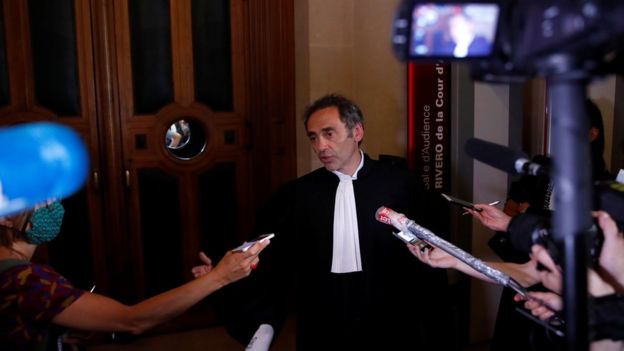
But such information was always "reactive", so the operation that led to his arrest took "a sophisticated, co-ordinated operation with simultaneous searches across a number of locations", he said.
It took at least two years, starting from his last known location - in Germany where he had last been sighted when he went for surgery in 2007.
Extensive analysis of telephone and financial data eventually led them to Paris.
"It is difficult to imagine he could have escaped into French territory without the help of accomplices," says Patrick Baudoin of the International Federation for Human Rights.
The mystery about his whereabouts for so many years has prompted Human Rights Watch to call for an investigation into how and who made this possible.
Pre-lockdown walks
His Paris neighbours say the elderly man had lived there for about three to four years.
Olivier Olsen, head of the association of homeowners in the building where he lived, told the AFP news agency that Mr Kabuga was "very discreet" and someone "who murmured when you said hello". 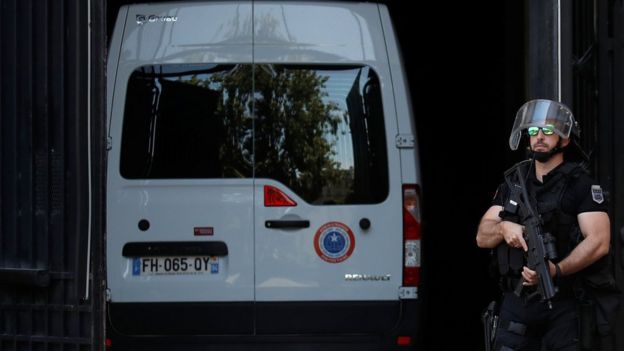
Before the lockdown he was often seen going out for walks, he said.
Mr Kabuga is now confined to La Santé Prison in central Paris, where he will stay until he is transferred into the custody of the IRMCT.
Mr Brammertz says this could take weeks or months and it could take a year before a trial begins - either in The Hague or the Tanzanian city of Arusha, where the ICTR sat.
However, Mr Kabuga's lawyers have stated that he would prefer to be tried in France.
Genocide survivors hope such procedures will not delay the justice they seek.
After his arrest Valerie Mukabayire, the leader of the Rwanda widows' group Avega, told the BBC: "Every genocide survivor is happy he is arrested. Everyone has been waiting for this news. It is a good thing that he is going to face justice."





